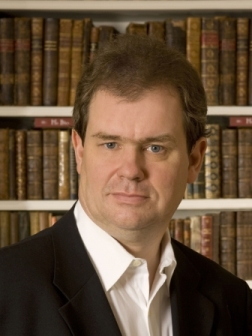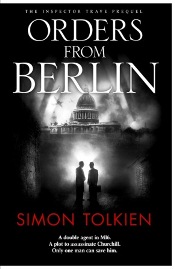Simon Tolkien studied Modern History at Trinity College, Oxford and then went on to become a successful barrister specializing in criminal justice where according to British custom he appeared on behalf of both the prosecution and the defense. His first novel, Final Witness, was published by Random House in 2002. His second novel, The Inheritance, was published by Minotaur Books in April 2010 and was followed by The King of Diamonds a year later. All Simon's novels are published by Harpercollins in the UK.

I did not start out as a historical fiction writer. My first novel, Final Witness was set in the present day, but uneasily so according to my critics. They were right: there was something old-fashioned in my writing that they had picked up on. I think that it dated back to the language and settings of the 19th century novels that I had read so voraciously when I was a boy. The gaslight and fog of Sherlock Holmes’s London or the claustrophobic atmosphere of Thornliffe Hall in Jane Eyre were far more real to me than the 1960s Oxfordshire village where I grew up.
And so with my next two books I moved the action back to 1959, the year of my birth. It was a time when England was looking forward into a new technological age, trying to forget about the trauma of the Second World War. But the characters in my novels could not escape the past – in The Inheritance a son was forced to atone for a massacre of French civilians committed by his father in Normandy in 1944; in The King of Diamonds another son set out to exact revenge for the betrayal of his Jewish parents to the Nazis by a greedy Antwerp diamond dealer. Inspector Trave, my world- weary detective, had to travel to France and Belgium and search back through the years to solve murders that could only be explained by these past events.
And I was going back too into my own past. As a child I’d been passionate about history, drawing maps of Napoleon’s battlefields, speculating that Richard the Third was innocent of his misdeeds, imagining what it might have been like to stand on the quarter deck of Nelson’s flagship at Trafalgar. Except that now my focus had shifted forward to those momentous days in the autumn of 1940 when Britain stood alone after the fall of France and faced the terrifying prospect of invasion for the first time since the Napoleonic Wars.
The course of history is so often determined by social and economic forces over which political leaders have little control, but this period seemed different. So much seemed to depend on Winston Churchill’s larger-than-life personality. His speeches over the radio preserved the country’s fragile morale and his stubborn determination to fight on against the odds, to the death if need be, frustrated the appeasers in his party who remained eager to come to terms with Nazi Germany. Because peace could certainly have been had without surrender. For Hitler the war in the west was a means to an end – to secure his flank before he invaded Russia. He had no wish to fight England and his support for the armed forces’ invasion plan, Operation Sea Lion, was at best half-hearted. How could he think otherwise when he believed that the British Empire was ‘a noble institution,’ enabling Aryans to rule over non-Aryans all over the world? Churchill’s refusal to negotiate made him bitterly frustrated.

It struck me that Hitler would have welcomed an assassination of Churchill and that if such a plan had succeeded then it could well have changed the outcome of the War. I also thought that Churchill would not have been an impossible target. He was known for taking constant risks with his personal safety, insisting on going up onto the roof of 10 Downing Street at night to watch the aerial dog fights overhead.
I had the idea for my book, but now I needed to decide on the identity of the assassin. I didn’t think that an agent sent from Germany could have got close enough to the Prime Minister to have a chance of success. MI5 was very successful throughout the War in apprehending enemy agents who came to England. But a British spy, a double agent acting on orders from Berlin, was a more realistic proposition. Churchill placed far greater emphasis than his predecessors on the use of espionage in warfare. The Secret Intelligence Service was massively expanded during his premiership and he reversed his predecessors’ policy of only communicating with the Service through third parties. I thought that he would certainly have wanted to see a spy who had vital information about the threatened invasion. He would have had no reason to suspect that the information was false and a face-to-face meeting would have provided a perfect opportunity for an assassination attempt.
I was going to write a book about spies and I was sure from the outset that I shouldn’t portray them as glamorous. My MI6 owes much more to the novels of John le Carré than those of Ian Fleming. At the headquarters there are linoleum floors and peeling paint; cold hallways and the smell of disinfectant, and a skeletal caretaker who mans the door. And as in Tinker, Tailor, Soldier, Spy there is an old chief who is convinced that there is a mole burrowed deep inside the organization but no one will listen to his warnings.
Not just spies but also their masters – I wanted to have Hitler and Churchill appear as real characters in my book. This was a new and interesting challenge to me. I couldn’t invent characteristics for them as they were real people and yet I had to make them three dimensional like my fictional characters. The weighty biographies I read didn’t help me very much; I needed to know what they liked to eat and drink; how they dressed and how they spoke. With Hitler what helped me most were the home movies shot by his mistress, Eva Braun, and her friends at the Berghof, his mountain retreat in Bavaria. In 2006 new computer software that can read lips at almost any angle enabled a soundtrack to be added to the films and I watched them over and over again on you tube, trying to get a sense of the man. For Churchill I listened to his speeches and trawled for clues through first-hand accounts by people who had known him. In the Cabinet War Rooms, his underground bunker, I sensed his personality everywhere. It’s an extraordinary place – claustrophobic and inspiring. 21st century London seems a long way away once you go down the steps; 1940 seems far closer – just out of reach on the other side of a gossamer curtain.
So I had a plot and I had characters, but I was still a long way from being ready to write because the most extensive area of research was still in front of me. I needed to recreate 1940; I needed to try to make my readers feel what it would have been like to have lived in London during the Blitz when people were in constant fear of their lives and yet continued to work and go out to dance halls and cinemas, refusing to be terrorised by the bombing. History books didn’t help here; I needed primary sources, and I owe a great debt to The People’s War internet archive created by the BBC between 2003 and 2006 when researchers and volunteers travelled all over the UK, gathering tens of thousands of stories from the generation that lived through the war. There are heartbreaking accounts of children evacuated away from their families; of rescuers digging down through the rubble to people trapped underground; of love among the ruins. I was deeply moved by what I read, particularly as I knew that many of the storytellers were now dead. The project had been a race against time to collect their testimony before it was too late.
The People’s War followed in the footsteps of Mass Observation, a nationwide enterprise begun in the 1930s in which contributors wrote down their day to day experiences to build up a picture of what life was like. I was inspired in particular by the diaries of Nella Last to try to write not just about Hitler and Churchill but about ordinary men and women. Ava, the heroine of my story, follows the example of other women in the war to make a new life independent of a domineering father and husband. And Detective Trave, the hero of my previous two novels, appears in this one as a humble detective constable who’s called out one evening to a run-of-the-mill murder and comes to realise that he may have stumbled on a plot to assassinate Winston Churchill and change the course of history.
Simon Tolkein, Santa Barbara, California. November 2012.
online
online what to do when husband cheats
i dreamed my husband cheated on me
redirect website
why do women cheat on their husbands
infidelity marriage affairs
i need to cheat on my girlfriend
link i cheated on my girlfriend and i want her back
why do people cheat
link i dreamed my wife cheated on me
cheats
site why women cheat in relationships
free drug coupons
link rx discounts
discount prescription drug card
read free discount prescription cards
cialis coupons printable
click cialis coupons from manufacturer
prescription drugs discount cards
evans.com.mx discount drug coupons
rezeptfreie potenzmittel apotheke
viagra potenzmittel rezeptfrei
medical abortion pill
akum.org abortion pill price
discount coupons for prescriptions
activeslo.com cialis manufacturer coupon 2016
depade naltrexone
link revia and alcohol